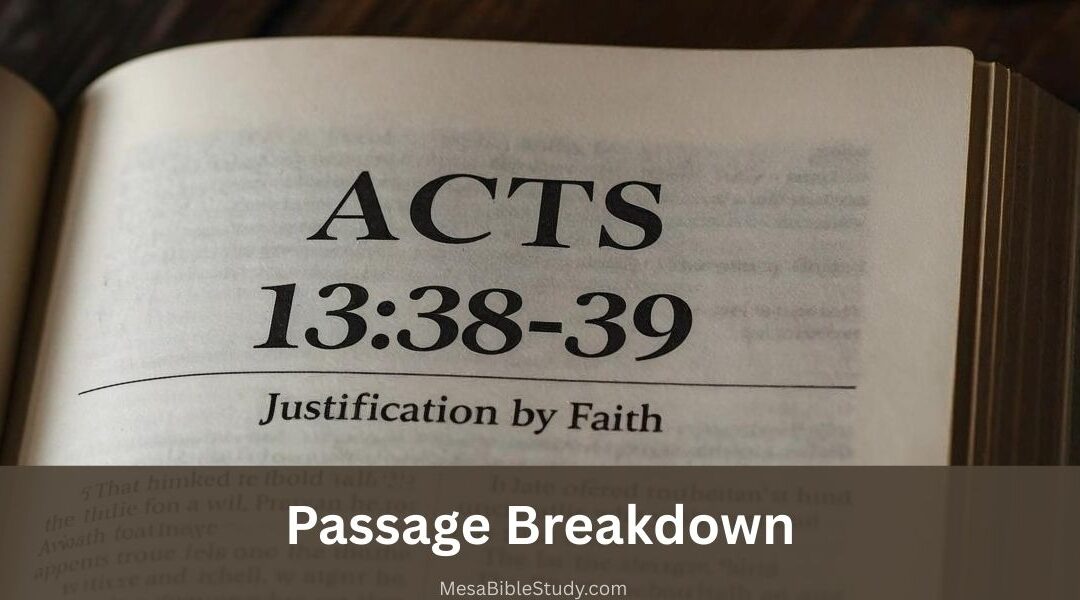
by Jamie Pantastico | Feb 18, 2026 | Bible Doctrine |
Why Nothing Matters More Than 1 Corinthians 15:3–4
There is one truth in all of Scripture that stands above every other truth when it comes to salvation.
Not church membership.
Not obedience to religious systems.
Not moral reform.
Not tradition.
The apostle Paul, writing under divine inspiration, identifies it plainly:
“For I delivered to you first of all that which I also received: that Christ died for our sins according to the Scriptures, and that He was buried, and that He rose again the third day according to the Scriptures.”
(1 Corinthians 15:3–4)
Paul calls this message “first of all.”
The Greek word is prōtos.
It means:
- first in order
- first in rank
- first in importance
This is not one truth among many.
This is the truth.
The Gospel Is the Foundation of Salvation
Paul begins this chapter by reminding believers of the gospel he had already preached to them:
“Moreover, brethren, I declare to you the gospel which I preached to you, which also you received and in which you stand, by which also you are saved…”
(1 Corinthians 15:1–2)
This statement leaves no ambiguity.
Salvation is not achieved through effort, performance, or religious activity.
It is received through believing (faith-alone) the gospel.
And Paul defines that gospel precisely.
Not symbolically.
Not figuratively.
But historically and literally:
- Christ died (shed His blood) for our sins
- He was buried
- He rose again the third day
These three events form the complete, finished, and sufficient basis of salvation.
Nothing can be added to them.
Nothing needs to be added to them.
“I Delivered to You What I Also Received”
Paul makes an extraordinary claim:
“I delivered to you first of all that which I also received…”
(1 Corinthians 15:3)
He did not invent this message.
He received it.
And he explains exactly how he received it:
“But I make known to you, brethren, that the gospel which was preached by me is not according to man.
For I neither received it from man, nor was I taught it, but it came through the revelation of Jesus Christ.”
(Galatians 1:11–12)
This gospel was revealed directly to Paul only by the risen, ascended, and glorified Lord Jesus Christ.
It was not inherited through human tradition.
It was not passed down through Peter and the apostles.
It was revealed from heaven itself.
Paul, by Holy Spirit inspiration, refers to this gospel as “my gospel” multiple times throughout his letters.
“In the day when God shall judge the secrets of men by Jesus Christ according to my gospel.” – Romans 2:16
“Now to him that is of power to stablish you according to my gospel, and the preaching of Jesus Christ, according to the revelation of the mystery, which was kept secret since the world began…” – Romans 16:25
Resurrection According to “Paul’s Gospel”
“Remember that Jesus Christ of the seed of David was raised from the dead according to my gospel:” – 2 Timothy 2:8
To the Corinthians, Paul makes another extraordinary claim— proclaims to be the masterbuilder who lays the foundation of the grace of God upon which other men build.
“According to the grace of God which is given unto me, as a wise masterbuilder, I have laid the foundation, and another buildeth thereon.” – 1 Corinthians 3:10
Why the Death, Burial, and Resurrection Matter
Each component of the gospel is essential.
Christ Died for Our Sins
This was substitution.
He died in our place.
“But God demonstrates His own love toward us, in that while we were still sinners, Christ died for us.”
(Romans 5:8)
The penalty for sin was fully satisfied.
He Was Buried
His burial confirms His death was real.
He did not faint.
He did not merely appear to die.
He died completely.
This verifies the completeness of His sacrifice.
He Rose Again the Third Day
The resurrection is the proof of victory.
“Who was delivered up because of our offenses, and was raised because of our justification.”
(Romans 4:25)
His resurrection confirms that sin was defeated, death was conquered, and justification was secured.
Why Paul Calls This “Of First Importance”
Because without this gospel, there is no salvation.
Paul states plainly:
“…by which also you are saved, if you hold fast that word which I preached to you—unless you believed in vain.”
(1 Corinthians 15:2)
This means salvation rests entirely on this message.
Not partially.
Entirely.
If this gospel is misunderstood, altered, or replaced, then the foundation itself is lost.
And if the foundation is lost, nothing else matters.
Doctrine cannot save.
Religious effort cannot save.
Only the gospel saves.
The Gospel Removes All Human Merit
Scripture makes this unmistakably clear:
“But to him who does not work but believes on Him who justifies the ungodly, his faith is accounted for righteousness.”
(Romans 4:5)
Salvation is not achieved through human effort.
It is received by faith in Christ’s finished work.
This is grace.
Grace leaves no room for human pride.
Grace declares that Christ did everything necessary.
Why This Truth Has Always Been Opposed
Grace removes human contribution.
It removes human merit.
It removes human boasting.
And human nature resists that.
Many accept that Christ is necessary—but struggle to accept that He is sufficient.
Yet Scripture declares:
“For by grace you have been saved through faith, and that not of yourselves; it is the gift of God, not of works, lest anyone should boast.”
(Ephesians 2:8–9)
‘knowing that a man is not justified by the works of the law but by faith in Jesus Christ, even we have believed in Christ Jesus, that we might be justified by faith in Christ and not by the works of the law; for by the works of the law no flesh shall be justified.’
Galatians 2:16
The gospel leaves nothing for man to complete.
Christ completed it all.
The Gospel Is the Line That Determines Eternal Destiny
This is why Paul calls it prōtos.
First in importance.
Because eternity itself rests upon it.
Every believer stands on this foundation.
Every believer is saved by this gospel.
Every believer is secure because of this finished work.
Final Summary
The gospel declared in 1 Corinthians 15:1–4 is not merely important.
It is of first importance.
Christ died for our sins.
He was buried.
He rose again the third day.
This is the gospel that saves.
It is complete.
It is sufficient.
And it is the foundation upon which everything else stands.
Nothing else matters if this is not understood and believed.
Because this gospel alone is the power of God unto salvation.
For I am not ashamed of the gospel of Christ, for it is the power of God unto salvation for everyone who believes, for the Jew first and also for the Greek.
Romans 1:16

by Jamie Pantastico | Feb 16, 2026 | Verse-by-Verse Bible Studies |
Passage Breakdown
“Therefore let it be known to you, brethren, that through this Man is preached to you the forgiveness of sins; and by Him everyone who believes is justified from all things from which you could not be justified by the law of Moses.”
(Acts 13:38–39, NKJV)
Who Wrote It?
The book of Acts was written by Luke, under the inspiration of the Holy Spirit (Luke 1:1–4; Acts 1:1). Luke records the historical transition from God’s covenant dealings with Israel to the revelation of the mystery of the gospel of grace through the apostle Paul.
Who Was It Written To?
Paul is speaking to Jews and God-fearing Gentiles in the synagogue at Antioch of Pisidia.
Acts 13:16 identifies the audience:
“Men of Israel, and you who fear God, listen.”
This audience includes:
- Jews
- Gentile proselytes (God-fearers)
This is a mixed audience, unlike earlier Acts where Peter spoke exclusively to Israel.
This marks an important transition point.
When Was It Spoken?
This occurs during Paul’s first missionary journey, approximately A.D. 46–48.
This is well after:
- Pentecost
- Peter’s early preaching to Israel
- and after Paul’s conversion and apostleship had been established
Paul is now functioning in his divinely appointed role as apostle to the Gentiles (Romans 11:13).
Immediate Context
Paul is preaching in the synagogue and reviewing Israel’s history, showing how Jesus fulfills the promises made to David.
Acts 13:23:
“From this man’s seed, according to the promise, God raised up for Israel a Savior—Jesus.”
Paul then proclaims Christ’s death and resurrection (Acts 13:27–37).
Acts 13:38–39 is Paul’s doctrinal conclusion.
Phrase-by-Phrase Breakdown
“Therefore let it be known to you, brethren”
Paul is making a formal doctrinal declaration.
This is an authoritative apostolic proclamation.
He is revealing something of tremendous importance.
“that through this Man”
“This Man” refers to Jesus Christ.
Paul emphasizes that forgiveness and justification come through Christ alone.
Not through the Law.
Not through works.
Through Christ.
“is preached to you the forgiveness of sins”
Forgiveness is now being proclaimed based on Christ’s finished work.
This aligns with Paul’s later writings:
Ephesians 1:7:
“In Him we have redemption through His blood, the forgiveness of sins.”
This forgiveness is based on Christ’s death and resurrection.
“and by Him everyone who believes”
This phrase marks a major doctrinal expansion.
“Everyone who believes” includes:
This is no longer limited to Israel alone.
Faith is now the sole requirement.
“is justified from all things”
Justified means declared righteous before God.
This is courtroom language.
This is one of the clearest declarations of justification in Acts.
This aligns perfectly with Paul’s later epistles:
Romans 5:1:
“Therefore, having been justified by faith, we have peace with God.”
“from which you could not be justified by the law of Moses”
This statement was unheard of until Paul.
Paul explicitly declares that the Law of Moses could not justify.
This confirms:
- justification is not by Law
- justification is by faith in Christ
This aligns with Galatians 2:16:
“Knowing that a man is not justified by the works of the law but by faith in Jesus Christ.”
This is clear grace doctrine.
What This Passage Clearly Teaches
Acts 13:38–39 clearly teaches:
- forgiveness of sins comes through Jesus Christ
- justification is by faith
- the Law of Moses cannot justify
- justification is available to all who believe
- Paul is proclaiming grace-based justification
This marks a major doctrinal advancement beyond Peter’s earlier covenant-focused preaching.
What This Passage Does NOT Teach
This passage does NOT teach:
- justification by the Law
- covenant-based national restoration language
- kingdom offer tied to Israel’s national repentance
Instead, it teaches individual justification by faith.
This aligns directly with Paul’s later epistles.
Why This Passage Matters
Acts 13:38–39 represents a major turning point in Acts.
Here, Paul clearly proclaims justification apart from the Law.
This is fully consistent with the mystery revealed to Paul.
This passage prepares the reader for the full development of grace doctrine in Romans, Galatians, and Ephesians.
Doctrinal Summary
Acts 13:38–39 marks a decisive transition from covenant-based kingdom proclamation to grace—justification by faith apart from the Law. Through the apostle Paul, God reveals that forgiveness and justification are available to all who believe the gospel alone, and that the Law of Moses cannot justify. This passage aligns directly with the revelation of grace given to Paul and forms a foundational declaration of justification by faith for the present administration of grace.
Final Summary
Acts 13:38–39 stands as one of the clearest points of transition from law to grace. Afterall the book of Acts is a book of transition.
Through Paul, God reveals that forgiveness and justification come through Jesus Christ alone—not through the Law.
This passage prepares the way for the full revelation of grace that Paul would later unfold in his epistles.

by Jamie Pantastico | Feb 14, 2026 | Verse-by-Verse Bible Studies |
“Repent therefore and be converted, that your sins may be blotted out, so that times of refreshing may come from the presence of the Lord, and that He may send Jesus Christ, who was preached to you before, whom heaven must receive until the times of restoration of all things, which God has spoken by the mouth of all His holy prophets since the world began.”
(Acts 3:19–21)
Who Wrote It?
The book of Acts was written by Luke, under the inspiration of the Holy Spirit (Luke 1:1–4; Acts 1:1). Luke records the continuation of God’s dealings with Israel following the resurrection and ascension of Jesus Christ, documenting events during this critical transitional period.
Who Was It Written To?
Peter is speaking directly to the nation of Israel, specifically Jewish men gathered at the temple in Jerusalem.
Acts 3:12 identifies the audience clearly:
“Men of Israel, why do you marvel at this?”
This is covenant Israel—not Gentiles and not the Body of Christ.
When Was It Spoken?
This occurs shortly after Pentecost, approximately A.D. 30–33, early in Acts.
This is still within God’s prophetic dealings with Israel and before the later revelation of the mystery given to Paul (Ephesians 3:1–9; Colossians 1:26).
“Retroactively forcing Paul’s gospel into Acts 3 undermines the integrity of Scripture. It ignores who Peter was speaking to, what was being offered, and the fact that the mystery of the Body of Christ had not yet been revealed.”
Immediate Context
Peter and John have just healed a lame man at the temple gate (Acts 3:1–10). This miracle
draws a crowd of Jews in the temple.
Peter immediately connects the miracle to Israel’s Messiah:
Acts 3:13:
“The God of Abraham, Isaac, and Jacob… has glorified His Servant Jesus, whom you delivered up and denied.”
This is covenant language, directly connecting Jesus to Israel’s promises.
Acts 3:19–21 is Peter’s call for national repentance in light of Israel’s rejection of their Messiah.
Phrase-by-Phrase Breakdown
“Repent therefore”
Repent means to change one’s mind.
Peter is calling Israel to change their mind about Jesus Christ, whom they rejected and crucified.
This is consistent with Acts 2:38 and Acts 5:31.
This repentance is connected to covenant restoration.
“and be converted”
Converted means to turn back or return.
This refers to Israel turning back to God in faith and recognizing Jesus as their Messiah.
This fulfills prophetic expectation:
Zechariah 12:10:
“They will look on Me whom they pierced.”
This is national repentance in view.
“that your sins may be blotted out”
Blotted out means completely erased.
This language comes directly from Old Testament covenant promises.
Isaiah 43:25:
“I, even I, am He who blots out your transgressions.”
Jeremiah 31:34:
“I will forgive their iniquity, and their sin I will remember no more.”
Peter is proclaiming fulfillment of these covenant promises.
“so that times of refreshing may come”
This refers to the promised kingdom.
This is not referring to personal spiritual refreshment, but to national restoration and kingdom blessing.
This connects directly to prophetic kingdom promises.
“from the presence of the Lord”
This refers to the visible, physical presence of Christ returning to establish His kingdom.
This aligns with prophetic expectation throughout the Old Testament.
“and that He may send Jesus Christ”
This is one of the most important phrases in Acts.
Peter is declaring that Israel’s repentance would result in Christ’s return.
This is kingdom offer language.
This is fully consistent with covenant prophecy.
“whom heaven must receive until”
Christ is currently in heaven.
His return is future and connected to prophetic fulfillment.
Psalm 110:1:
“Sit at My right hand, till I make Your enemies Your footstool.”
“the times of restoration of all things”
This refers to the restoration of Israel and the establishment of the kingdom.
This includes:
- restoration of Israel
- fulfillment of covenant promises
- Messiah’s earthly reign
This is prophetic kingdom language.
“which God has spoken by the mouth of all His holy prophets since the world began”
This is decisive.
Peter explicitly states that he is speaking about something:
spoken by the prophets since the world began.
This is not the mystery.
The mystery was:
“kept secret since the world began.”
(Romans 16:25)
Peter is proclaiming prophecy—not mystery.
What This Passage Clearly Teaches
Acts 3:19–21 clearly teaches:
- Peter is addressing Israel
- Israel is called to repent for rejecting their Messiah
- National repentance is connected to kingdom restoration
- Christ’s return is linked to Israel’s prophetic restoration
- This fulfills Old Testament prophecy
This is covenant fulfillment being offered to Israel.
What This Passage Does NOT Teach
Acts 3:19–21 does NOT teach:
- the revelation of the Body of Christ
- justification by grace apart from the Law as later revealed by Paul
- the mystery hidden from previous ages
- Jew–Gentile equality in one body
Peter explicitly states this is prophetic, not mystery revelation.
Why This Passage Matters
Acts 3:19–21 is one of the clearest kingdom-offer passages in Scripture.
It demonstrates that early Acts remains fully grounded in Israel’s covenant program.
Peter is proclaiming the fulfillment of prophetic promises made long before.
Understanding this passage clarifies the progressive unfolding of God’s redemptive plan.
Doctrinal Summary
Acts 3:19–21 stands firmly on covenant ground. Peter is calling Israel to national repentance in fulfillment of prophetic promises concerning the restoration of the nation and the return of their Messiah. This passage belongs entirely to Israel’s prophetic kingdom program, not the later revelation of the Body of Christ given through the apostle Paul. Peter explicitly identifies this message as prophecy spoken since the world began, not the mystery kept secret until Paul.
Final Summary
Acts 3:19–21 reveals that Israel’s Messiah had come, been rejected, and now stood ready to return upon the nation’s repentance.
Peter is proclaiming covenant fulfillment, kingdom restoration, and prophetic promises made to Israel.
Understanding this passage in its proper context preserves the clarity and unity of Scripture and prepares the reader for the later revelation of grace through Paul.
To learn more about this ministry’s purpose and doctrinal foundation, visit the About page.

by Jamie Pantastico | Feb 12, 2026 | Verse-by-Verse Bible Studies |
“Then Peter said to them, ‘Repent, and let every one of you be baptized in the name of Jesus Christ for the remission of sins; and you shall receive the gift of the Holy Spirit.’”
(Acts 2:38, NKJV)
Who Wrote It?
The book of Acts was written by Luke, under the inspiration of the Holy Spirit (Luke 1:1–4; Acts 1:1). Luke records the historical continuation of God’s dealings with Israel following the resurrection and ascension of Jesus Christ.
Who Was It Written To?
Peter is speaking directly to the nation of Israel, specifically Jewish men gathered in Jerusalem for Pentecost.
Acts 2:5 makes this explicit:
“And there were dwelling in Jerusalem Jews, devout men, from every nation under heaven.”
And Peter addresses them directly:
Acts 2:22:
“Men of Israel, hear these words…”
This is not a Gentile audience.
This is not the Body of Christ.
This is covenant Israel.
When Was It Spoken?
This occurs on the day of Pentecost, approximately A.D. 30.
This is:
- 50 days after the resurrection
- after the ascension
- but BEFORE the revelation of the mystery given later to Paul
At this point in Acts, the Body of Christ had not yet been revealed (Ephesians 3:1–9; Colossians 1:26).
Immediate Context
Peter has just declared that Israel crucified their Messiah:
Acts 2:36:
“Therefore let all the house of Israel know assuredly that God has made this Jesus, whom you crucified, both Lord and Christ.”
The audience is convicted:
Acts 2:37:
“Now when they heard this, they were cut to the heart, and said… ‘Men and brethren, what shall we do?’”
Acts 2:38 is Peter’s direct answer to Israel’s question.
Phrase-by-Phrase Breakdown
“Repent”
Repent means to change one’s mind.
Here, Israel is being called to change their mind about Jesus Christ—whom they rejected and crucified.
This fulfills prophetic expectation:
Zechariah 12:10:
“They will look on Me whom they pierced. Yes, they will mourn for Him.”
This is national repentance in view.
“and let every one of you be baptized”
Water baptism was already a familiar covenant practice in Israel.
John the Baptist had preached:
Mark 1:4:
“John came baptizing… and preaching a baptism of repentance for the remission of sins.”
This baptism identified believing Israelites with their Messiah.
It was an outward expression of covenant repentance.
“in the name of Jesus Christ”
This is critical.
Israel had rejected Jesus as Messiah.
Now they must publicly identify with Him as the true Christ.
This marks a reversal of their previous rejection.
“for the remission of sins”
Remission means forgiveness.
This connects directly to covenant promises made to Israel.
Jeremiah 31:34:
“For I will forgive their iniquity, and their sin I will remember no more.”
Peter is declaring that forgiveness is now available through their risen Messiah.
This is covenant fulfillment language.
“and you shall receive the gift of the Holy Spirit”
This fulfills Old Testament prophecy:
Joel 2:28:
“I will pour out My Spirit on all flesh.”
Peter explicitly states earlier:
Acts 2:16:
“This is what was spoken by the prophet Joel.”
This confirms that Pentecost is covenant fulfillment—not the revelation of the mystery.
What This Passage Clearly Teaches
Acts 2:38 clearly teaches:
- Peter is speaking to Israel
- Israel is being called to repent for rejecting their Messiah
- Baptism identifies believers with Christ
- Forgiveness is being offered in fulfillment of covenant promises
- The Holy Spirit is given in fulfillment of prophecy
This is entirely consistent with Israel’s prophetic program.
What This Passage Does NOT Teach
Acts 2:38 does NOT teach:
- the revelation of the Body of Christ
- justification by grace apart from the Law (as later revealed by Paul)
- Jew–Gentile equality in one body
- the mystery hidden from ages
Those truths were revealed later through Paul (Ephesians 3:1–9).
Why This Passage Matters
Acts 2:38 marks the continuation of God’s covenant dealings with Israel after Christ’s resurrection.
Peter is proclaiming Israel’s risen Messiah and calling the nation to repentance.
This prepares the reader for the later transition when God reveals the mystery through Paul.
Understanding this preserves the clarity and consistency of Scripture.
Doctrinal Summary
Acts 2:38 stands firmly on covenant ground. Peter is addressing Israel and calling them to repent and identify with their Messiah in fulfillment of Old Testament prophecy. This passage belongs to Israel’s prophetic program, not the later revelation of the Body of Christ given through the apostle Paul. It demonstrates God’s continued offer of covenant forgiveness and restoration to His chosen nation.
Final Summary
Acts 2:38 is not the beginning of the Body of Christ.
It is the continuation of God’s covenant program with Israel.
Peter is proclaiming the risen Messiah to the very nation that crucified Him, offering repentance and forgiveness in fulfillment of promises made centuries earlier.
When understood in its proper context, this passage brings clarity—not confusion—to God’s unfolding redemptive plan.
To learn more about this ministry’s purpose and doctrinal foundation, visit the About page.

by Jamie Pantastico | Feb 11, 2026 | Verse-by-Verse Bible Studies |
The Diaspora Explains Pentecost
“Retroactively forcing Paul’s gospel into Acts 2 undermines the integrity of Scripture. It ignores who Peter was speaking to, what was being offered, and the fact that the mystery of the Body of Christ had not yet been revealed.”
One the common claims made in modern theology is that Gentiles were present in Peter’s Pentecost audience in Acts 2.
But Scripture itself clearly refutes that claim.
The answer is found in Acts 2:5.
“And there were dwelling in Jerusalem Jews, devout men, from every nation under heaven.”
(Acts 2:5, NKJV)
Luke does not say “Jews and Gentiles.”
He says Jews.
This is explicit.
This is decisive.
The Text Says Jews — Not Gentiles
The Greek word used here is Ioudaioi, meaning Jews—ethnic descendants of Abraham, Isaac, and Jacob.
Luke further describes them as:
“devout men”
This refers to faithful Jews who observed the Law of Moses and had come to Jerusalem for the Feast of Pentecost.
Pentecost was not a Gentile festival.
It was one of Israel’s required covenant feasts.
Deuteronomy 16:16 states:
“Three times a year all your males shall appear before the LORD your God in the place which He chooses.”
Pentecost was one of those required appearances.
Gentiles were never under this covenant obligation.
Only Jews were.
Why Were Jews Present from So Many Nations?
Acts 2:9–11 lists regions including:
- Parthia
- Media
- Elam
- Mesopotamia
- Judea
- Cappadocia
- Pontus
- Asia
- Phrygia
- Egypt
- Rome
Many assume these must be Gentiles.
But history explains otherwise.
These were Jews of the Diaspora.
The Diaspora Began with the Babylonian Captivity
In 606 BC, Babylon invaded Jerusalem and took many Jews into captivity.
Later, King Cyrus of Persia issued a decree allowing the Jews to return to Jerusalem.
Ezra 1:3:
“Who is among you of all His people? May his God be with him, and let him go up to Jerusalem.”
But most Jews did not return.
Only a small remnant returned under Zerubbabel (Ezra 2:64).
The majority remained scattered throughout the Gentile world.
Over the centuries, these dispersed Jews established:
- communities
- synagogues
- businesses
throughout the known world.
They adopted the language of the area. But they were still Jews.
This became known as the Diaspora.
The Diaspora Is Explicitly Confirmed in Scripture
James writes:
“To the twelve tribes which are scattered abroad: Greetings.”
(James 1:1)
Peter also writes:
“To the pilgrims of the Dispersion in Pontus, Galatia, Cappadocia, Asia, and Bithynia.”
(1 Peter 1:1)
Notice these same regions appear in Acts 2.
These were Jewish communities scattered across the world.
Not Gentiles.
Jews.
Pentecost Brought Diaspora Jews Back to Jerusalem
Faithful Jews from these regions returned to Jerusalem to observe Pentecost.
Acts 2:5 again makes this explicit:
“Jews, devout men, from every nation under heaven.”
These were covenant-observing Jews.
They came because of their covenant obligations.
This explains why they spoke different languages.
They had lived in Gentile lands for generations, but they remained Jews.
Acts 2:6–11 Confirms They Were Jews
These men say:
“How is it that we hear, each in our own language in which we were born?”
(Acts 2:8)
They are Jews born in foreign lands.
Not Gentiles.
They were ethnically Jewish but linguistically diverse due to the Diaspora.
Peter Addresses Israel — Not Gentiles
Peter begins his sermon by saying:
“Men of Israel, hear these words.”
(Acts 2:22)
And concludes:
“Let all the house of Israel know assuredly.”
(Acts 2:36)
Peter explicitly identifies his audience as Israel.
He never addresses Gentiles.
Not once.
Gentile Inclusion Comes Later in Acts
Gentiles do not enter the narrative until Acts 10, when Peter is sent to Cornelius.
Peter himself says:
“God has shown me that I should not call any man common or unclean.”
(Acts 10:28)
If Gentiles were already included in Acts 2, this revelation would not have been necessary.
Acts 10 marks the first Gentile inclusion.
Not Acts 2.
Why This Matters for Understanding Acts 2:38
Acts 2:38 must be interpreted in light of Acts 2:5.
Peter was speaking to Jews.
Covenant Israel.
Not the Body of Christ.
Not Gentiles.
This was covenant ground.
This was Israel’s Messiah being proclaimed to Israel.
Doctrinal Summary
Acts 2:5–12 clearly establishes that Peter’s Pentecost audience consisted entirely of devout Jews of the Diaspora, not Gentiles. These Jews had returned to Jerusalem in obedience to covenant obligations. This confirms that Peter’s message in Acts 2, including Acts 2:38, was directed specifically to Israel in fulfillment of covenant prophecy, not the later revelation of the Body of Christ given through Paul.
Final Summary
Acts 2 does not introduce Gentiles into the Body of Christ.
It shows Diaspora Jews returning to Jerusalem for Pentecost.
Peter proclaims Israel’s Messiah to Israel.
Understanding this preserves the integrity of Scripture and reveals God’s plan exactly as He intended.
Truth over Tradition.




